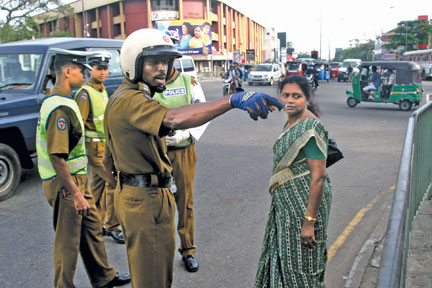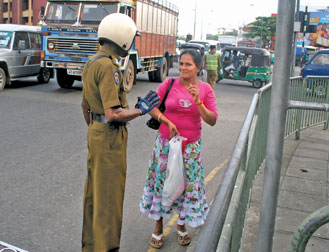Community partnerships
Gateway to a people-friendly police:
by Lionel WIJESIRI
It is good news that our law enforcement authorities believe the time
has come to alter the policies and practices of their organisations.
These reasons are rooted in the changing nature of communities, and in
the shifting characteristics of crime and violence that affect our
communities. Policing strategies that worked in the past are not always
effective today.
The desired goal, an enhanced sense of safety, security, and
well-being, has not been achieved. We must agree that there is a
pressing need for innovation to curb the crises in many communities.
Both the level and nature of crime in this country and the changing
character of Sri Lankan communities are the causes for police to seek
more effective methods.
 Many urban communities are experiencing serious problems with illegal
drugs, gang violence, murders, muggings, and burglaries. Suburban and
rural communities have not escaped unscathed. They are also noting
increases in crime and disorder. Many urban communities are experiencing serious problems with illegal
drugs, gang violence, murders, muggings, and burglaries. Suburban and
rural communities have not escaped unscathed. They are also noting
increases in crime and disorder.
In addition, the social fabric of our country has changed radically.
The family unit is not as stable as it once was. Working parents find
it extremely difficult to spend enough time with their children and
religious institutions and schools have been unable to fill this void.
In this rapidly changing environment, where police cope with numerous
issues, the concept of community policing is something which could be
seriously considered.
This is a universally used commonsense approach to the problems of
crime and disorder, an approach that has well enhanced and maximised
performance and resources, and had struck a responsive chord in both
national and local governments and in communities across those nations.
Community policing
Community policing is, in essence, collaboration between the police
and the community that identifies and solves community problems.
With the police no longer the sole guardians of law and order, all
members of the community become active allies in the effort to enhance
the safety and quality of communities.
The expanded outlook on crime control and prevention, the new
emphasis on making community members active participants in the process
of problem solving, and the police officers' pivotal role in community
policing require profound changes within the police organisation.
Creating a constructive partnership will require the energy, creativity,
understanding, and patience of all involved.
This assertion raises several questions. What are communities? What
should their relationship be with police? What opportunities are offered
both to communities and to police by restructuring their relationship?
This brief article addresses these questions by focusing upon the
ability of a community to defend itself against crime and disorder
without eliminating civility and justice from social relations there.
What is a community?
At a minimum, communities are places in which people live or work
near each other, recognise their recurring proximity, and signal this
recognition to each other. Moreover, neighbours in a community are not
just the residents of a special geographical area, but also include
shopkeepers and their employees, other workers who frequent areas
regularly (postal workers, for example).
The intensity of neighbouring relationships depends on many factors,
including geographical and physical characteristics of the community,
ethnic and kinship networks, effective attachment of residents to the
Community, home and business ownership, building construction features,
local facility usage, pedestrian and automotive traffic patterns, the
amount of time neighbours spend in the area, as well as demographic
patterns (e.g., the number of children, non-working adults, and the aged
who live in a community). The content of neighbouring can range from
curt nods of the head to regularly scheduled neighbourhood meetings.
Community Partnership
To make community friendly policing a success, formation of Community
Partnerships becomes imperative. A community partnership is the
establishment of a governance structure for a locality based on agencies
operating within the community working together.
A Community Partnership team should ideally consist of an elected
member and representatives of the local community representing
neighbourhoods and also including religious dignitaries. A successful
community partnership ensures that each of them not only are aware of
each other's work, but also plan together and provide effective
leadership for the area.
Many crimes are invisible to communities (domestic violence, fraud)
and have little impact on feelings of public safety; but some have an
impact on fear to the community disproportionate to the anticipated
impact for the victim - for example, criminal damage, visible drug
dealing or on-street prostitution. 'Signal disorders' (as they are
known) are those acts which impact negatively on people's perceptions of
an area.
Successful Community partnerships can help communities feel more
confident about their Communities by tackling these key indicators which
cause them to feel anxious.
Every representative working in an area has a role to play in
minimising the impact of these behaviours, and by taking a co-ordinated
approach. The Community partnership can ensure these are adequately
tackled in an efficient manner.
A successful community partnership will always include the input of
the elected representatives for the area.
 They are democratically elected advocates for a locality. By
co-operating with elected representatives, the Community partnership can
greatly boost the civic participation in the democratic process. They are democratically elected advocates for a locality. By
co-operating with elected representatives, the Community partnership can
greatly boost the civic participation in the democratic process.
By working directly with their representatives, residents should be
able to see the value of their vote - and should they be disappointed,
the ballot box enables them to remove the candidate.
Civic participation
Creating a climate that empowers local people and communities,
building a big society that will take power away from politicians and
give it to the people are goals that the authorities are striving to
achieve communities are to be given more power and encouraged to take an
active role in their communities.
Community partnerships are the obvious machine by which his
priorities can be embedded.
A truly strong community partnership brings in community members and
empowers citizens to help tackle the key issues in their communities.
Successful community partnerships have legitimacy within a community.
This link between legitimacy and increased public co-operation is
supported by evidence.
Increased trust is associated with the likelihood of following police
directions (for example, in public order situations) and for most people
compliance with the law, leading to a reduction in crime.
This legitimacy is gained by residents witnessing that the police is
working for the people, and are accountable to them.
It is essential that the public feel that they have real influence
over the partnership.
Because communities play such an integral role in forming national
and social networks, many studies analyse social problems in relation to
the communities where they occur.
If communities flourish, people's lives will likely flourish with
them. Conversely, if they deteriorate, lives will also deteriorate.
|

